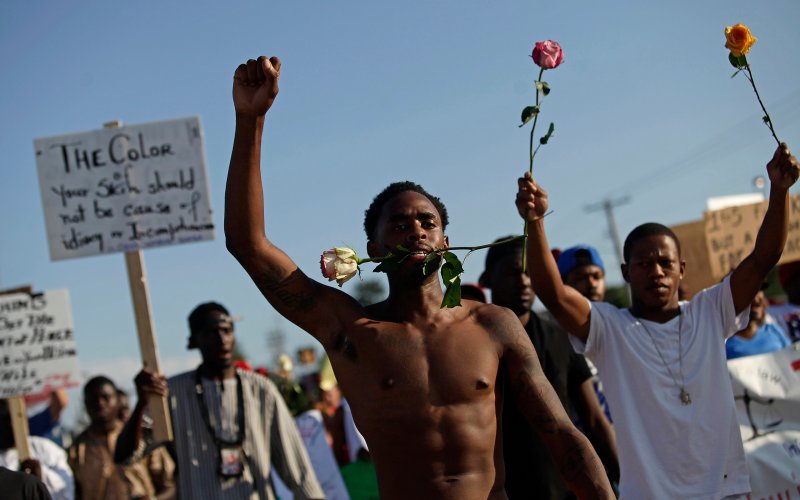
Prosecuting Officer Wilson Won’t Bring Justice to Ferguson
No parent should outlive a child. Michael Brown’s parents received this most shocking of news and in their grief are demanding to know the circumstances of their son’s death and who is responsible for it. In the long run, their son’s death may spark meaningful and lasting change in police practices, but criminal prosecution of the officer who killed Brown will not do that, cannot compensate the family, and will not change Ferguson, Missouri.
The legal system from which the Browns are demanding answers may tell them the circumstances of their son’s death—and they hired their own coroner to ensure the independence of the county’s autopsy findings—but prosecuting Officer Wilson will not produce the justice that they and the Ferguson community demand and deserve. Other legal options are more likely to achieve police accountability.
The physical evidence is but one indicator of the circumstances of Michael Brown’s death. In the days to come, we will surely hear more about witnesses’ accounts of the altercation that led to the shooting, forensic tests of clothing and the officer’s car, and medical reports about the officer’s injuries. All these facts are important because a jury might be asked to consider them in answering a crucial question: did Wilson reasonably believe he was acting in self-defense when he shot Brown?
Even if the prosecutor indicts Wilson, it will be hard to convict him. But dry evidentiary standards are not likely to be the concern of a community grieving over what they believe was the murder of an innocent man.
For very good reasons, a conviction is unlikely either in state or federal criminal court. As any television viewer knows, American justice requires that all elements of charges be proven beyond a reasonable doubt in order to convict a person of a crime. Suppose Missouri prosecutors charge Wilson with the crime of reckless manslaughter. Given the facts as we know them at this moment, would you be willing to say beyond a reasonable doubt that they add up to the conclusion that Wilson drew his gun with reckless disregard for consequences, and not because he had a justifiable reason to do so? Perhaps, but actually it is not for you to say—unless you are on the jury. In the past, juries in such cases usually have been unable to decide unanimously, beyond a reasonable doubt, whether an officer reasonably believed his or her life to be in danger and thus was shooting in self-defense. So they rarely convict.
Getting a unanimous jury verdict required to convict is unlikely in most such cases because the facts usually point to conflicting interpretations of the officer’s state of mind. There is no room for ambiguity in deciding guilt. The same standard of “proof beyond a reasonable doubt” that is required to convict a street criminal—a convenience store thief, for example— must apply also to an accused police officer. To do otherwise would be to permit the government to punish people without carefully proving they are actually guilty.
Furthermore, prosecuting Officer Wilson would amount to scapegoating. Unless Wilson intended to kill Brown because he was black, holding this officer personally responsible for the racially disparate impact of contemporary American policing will only compound the injustice so evident in this tragic shooting.
Frustrated Ferguson residents, perhaps knowing that a local court is unlikely to convict Wilson of manslaughter, have demanded that the federal prosecutor bring charges instead. Surely they have called for federal prosecution because they perceive that federal officials are not tied to local Missouri politics and will not be influenced by parochial loyalties. Many also probably believe that only a federal criminal prosecution will signal the gravity of this case and others like it where white police kill black men.
The federal legal system has a role to play here, but it is not with prosecution. Criminal justice is quintessentially a local matter; policing, judging, and operating local jails are municipal endeavors. (There are approximately 18,000 state and local police departments in the United States.) Officials appointed in Washington have no jurisdiction to prosecute someone for homicide in Missouri. However, they can prosecute Wilson for violation of Brown’s civil rights protected by the federal Constitution. The same standard of “proof beyond a reasonable doubt” would be applied to determine whether Wilson intended to kill Brown because he was black. Again, conviction on this charge is unlikely unless clear damning facts emerge. Time and vigorous investigation will tell.
Nevertheless, the federal court that sits in St. Louis will surely be the forum for a civil lawsuit, as opposed to a criminal prosecution. The Brown family will sue for monetary compensation as hundreds do every year in federal courthouses across the nation. The Browns will claim that their son’s death was the result of unconstitutional “custom, policy, or practice” by the Ferguson Police Department in permitting racial discrimination to flourish in its official activity. This lawsuit will be decided under a lower and more easily met standard of proof: “preponderance of the evidence.”
Such a lawsuit will point the finger where it belongs—not at an individual officer, but at the department that employed him and the city government that staffs that department. Even more broadly and appropriately, it would shine a spotlight on a political system that creates neighborhoods like those of Ferguson where black residents lack any meaningful political participation locally, creating animosity between whites and blacks. There is a chance that deep soul-searching among these different populations after the civil disturbances of the past week will prompt them to search for common ground in reforming their police department and government.
Such a process has been undertaken before in another city that experienced a riot after the shooting of an unarmed black man. In 2001, a police officer in Cincinnati, Ohio pursued and shot Timothy Thomas, who was suspected only of ignoring a warrant due to 12 unpaid traffic tickets and two suspected minor misdemeanors. At the time, about a dozen lawsuits concerning deaths at the hands of local police were pending in the local federal court. Residents of Over-the-Rhine, Cincinnati’s poorest neighborhood, responded with four days of civil disturbance—called a “riot” in the media but a “rebellion” in Over-the-Rhine.
When calm came to Cincinnati, residents from all neighborhoods and all levels of its society set out to understand the roots of that civil disturbance and reform their police department fundamentally. They did this within the structure of the lawsuits then pending in federal court and with the support of a federal Department of Justice consent decree. (Such “constitutional tort” lawsuits from the families of persons killed by Ferguson police have been filed in federal court there; also, Attorney General Eric Holder is considering whether to seek a consent decree for top-to-bottom overhaul of the police department.)
In Cincinnati, political activists from minority neighborhoods, representatives of religious communities, the police union, and city officials signed a “collaborative agreement” to work together to change their police department. Today, 13 years later, there have been no police shootings of young men in which the facts proved unjustified use of force.















